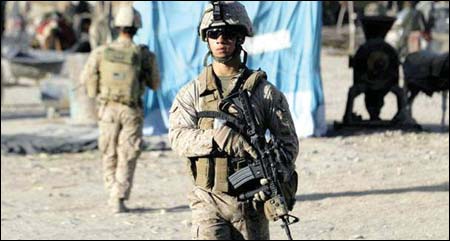|
Afghan - Taliban:
Peace deal seen at cost of rights
A Taliban return to Government is inevitable if Afghanistan is to
have any hope of peace, but the cost is likely to be erosion of rights
and a rollback from democracy, a growing number of experts believe.
|

More than 2,000 foreign troops have died in the war since
2001, and though many civilians have also been killed –
mostly in Taliban attacks – Afghans often blame the violence
on foreign forces. Reuters |
Military commanders, officials, diplomats and academics say talks
with the Taliban are key to ending Afghanistan's long and punishing war
but many expect the Kabul Government and its supporters to compromise
for the sake of peace.
The independent United States Institute of Peace said this week the
Afghan Government and its Western backers 'should seek to engage in
direct or indirect exploratory talks with the Taliban'
"An agreement could threaten human rights and freedoms, especially
those of women and girls, and democratization," it added. With Western
public support for engagement in Afghanistan falling and the cost in
blood and treasure rising, Kabul's backers are eager for an exit - but
one that will not look like a surrender.
To that end the United States is spending billions training
Afghanistan's army and police to take responsibility for security by
2014, enabling a pull-out of combat forces that President Barack Obama
wants to begin next year.
The war has entered its tenth year since the Taliban's misogynist and
radical Islamist regime was overthrown in a US-led invasion, after which
they regrouped to launch their insurgency.
Nato and the United States have more than 150,000 troops fighting the
insurgency, which is concentrated in the south but has spread to most
areas outside the capital.
President Hamid Karzai this month set up the High Council for Peace
to head up his plans for dialogue with the Taliban and other insurgent
groups.
Members of the council say the Taliban have signalled a 'willingness'
for a political solution and Nato's commander in Afghanistan said his
troops had helped at least one Taliban leader get to Kabul to meet
Afghan officials.
"In certain respects we do facilitate that, given that, needless to
say, it would not be the easiest of tasks for a senior Taliban commander
to enter Afghanistan and make his way to Kabul if ISAF were not witting
and therefore aware of it and allows it to take place," US General David
Petraeus said in London last week.
Talks would give the Taliban a strong hand at the negotiating table,
threatening the existing constitution, according to some experts. Afghan
analyst Haroon Mir said the Kabul Government already contained 'radical'
elements who would welcome Taliban extremists.
"If there is to be a coalition Government, it will be a coalition of
radicals of both sides, who will amend the constitution," Mir said.
"In that case it is certain that we will lose many of the
achievements of recent years - freedom of speech, women rights, and
minorities will be targeted." There appears to be a widespread consensus
that the Taliban are exploiting popular disillusionment with the war to
set up 'shadow' governance structures, as they exact a heavy toll of
foreign troops on the battlefield.
More than 2,000 foreign troops have died in the war since 2001, and
though many civilians have also been killed - mostly in Taliban attacks
- Afghans often blame the violence on foreign forces.
The Afghanistan NGO Safety Office, a security monitoring group, said
last week the war would 'become increasingly peripheral' as the Taliban
'are certain to play a permanent and increasingly political role' in
Afghanistan's future.
Women's and human rights groups have expressed fears that Karzai and
his backers would be willing to compromise post-2001 constitutional
gains should the Taliban demand such conditions in return for a peace
deal.
Taliban rule was marked by general repression that was particularly
brutal towards women. Girls were not permitted to go to school, women
were not allowed out unless accompanied by a male relative and wearing a
burqa.
Even today, women who become politically active often face death
threats and some have been murdered or forced into exile abroad. The
Dawn
|



